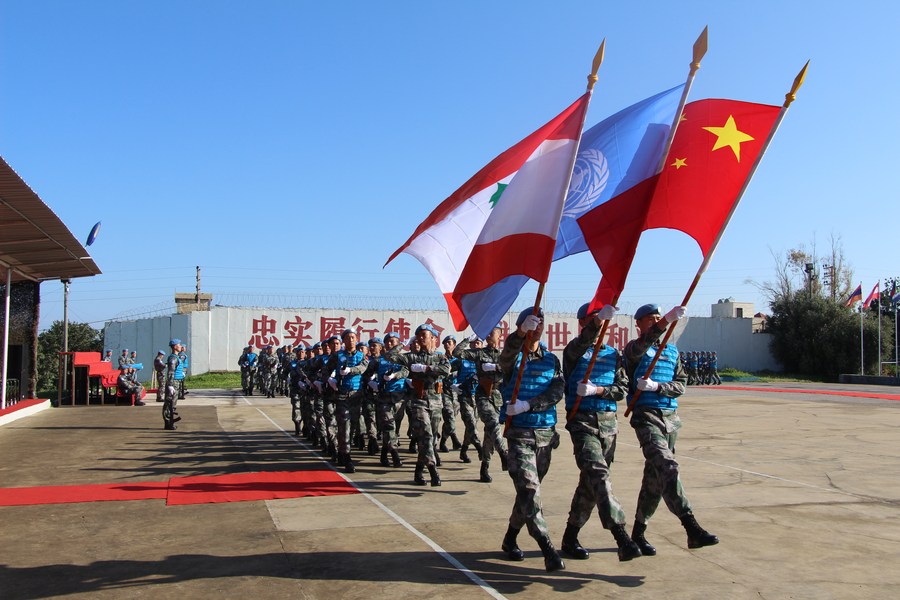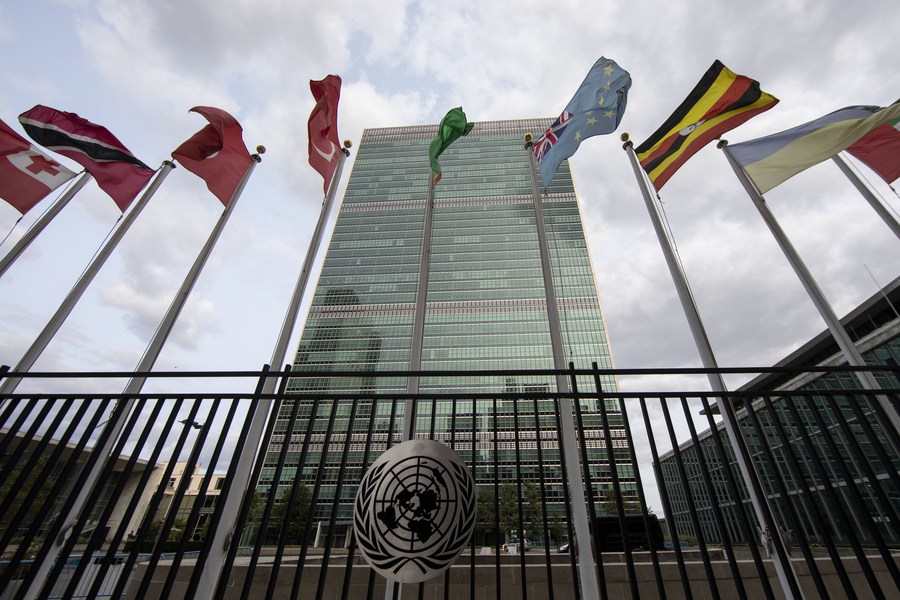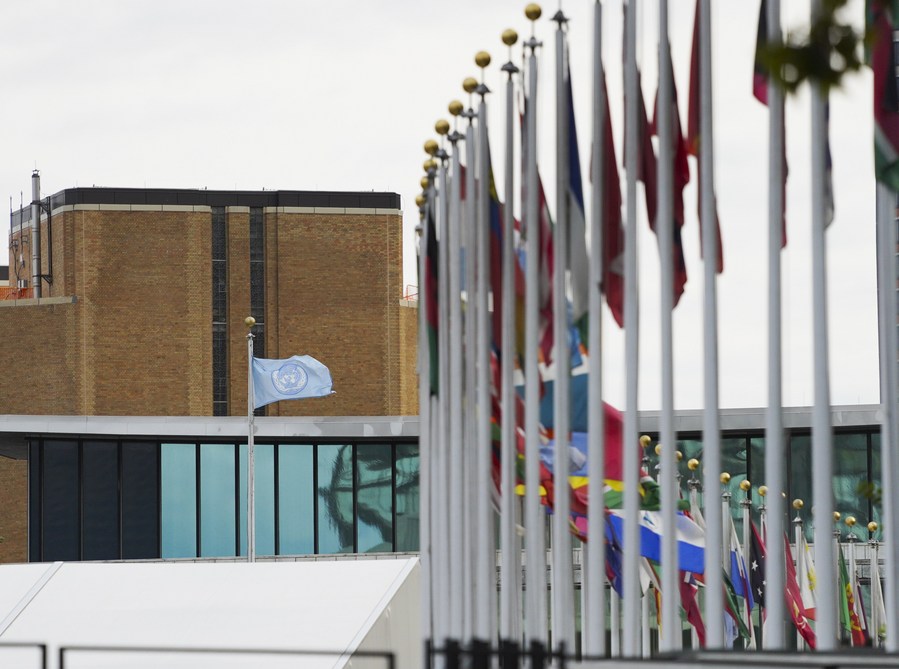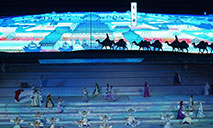Xi Jinping -- Committed to advancing UN cause for better world

Chinese peacekeepers march during a medal ceremony in Hanniyah village, southern Lebanon, April 3, 2019. (Xinhua)
BEIJING, Oct. 24 (Xinhua) -- "It falls on each and every responsible statesman to answer the questions of our times and make a historical choice with confidence, courage and a sense of mission."
As the leader of a major country that is playing an ever more significant role in today's increasingly interconnected and profoundly changing world, Chinese President Xi Jinping, who made the call at the UN General Assembly in September, has already given his answer.
Committed to his flagship vision of building a community with a shared future for mankind, Xi has, among other efforts, been leading China, the world's most populous and largest developing country, to continuously deepen and expand cooperation with the United Nations, the world's most universal, representative and authoritative international organization.
Upon the 50th anniversary of the restoration of the lawful seat of the People's Republic of China in the United Nations, Xi is set to reaffirm Beijing's support for the UN cause, redouble China's efforts for international cooperation, and reinvigorate global action for a better world.

Photo taken on Sept. 14, 2020 shows the outside view of the United Nations headquarters in New York, the United States. (Xinhua/Wang Ying)
FUTURE-ORIENTED VISION
In the eyes of former UN Secretary-General Ban Ki-moon, Xi is "a man of a future-oriented vision."
During his tenure as the UN chief, Ban interacted with Xi on many occasions. One of the most unforgettable, he told Xinhua in a recent interview, was how Xi went to great lengths to promote the ratification of the hard-won Paris Agreement on climate change, a grave threat to humanity that had long been at the top of the UN agenda.
A major breakthrough came when Xi invited Ban and then U.S. President Barack Obama to visit China's eastern city of Hangzhou on Sept. 3, 2016, one day ahead of the opening of the G20 Hangzhou summit.
At a "very unexpected event," Ban recalled, Xi and Obama both presented him with the instrument of ratification of the Paris accord.
"That was historic," said Ban, explaining that such a joint move by China and the United States was "vital" as it galvanized other parties into accelerating the ratifying process. Two months after the Hangzhou event, the deal officially came into effect.
"Had (there) not been President Xi Jinping's initiative, we would not have the Paris climate change agreement even now. Then I really sighed with a deep relief," Ban told Xinhua. "The world was saved."
From then on, China has further intensified its painstaking transformation towards green development. Now Xi has announced that China aims to peak carbon dioxide emissions before 2030 and achieve carbon neutrality before 2060, which means the developing country will complete the world's largest reduction in carbon emission intensity in the shortest time in global history.
"There is only one Earth in the universe and we mankind have only one homeland," Xi said at the UN Office at Geneva in 2017. "We should not only think about our own generation, but also take responsibility for future ones."

Aerial photo taken on Feb. 24, 2021 shows a molten-salt solar thermal power plant in Dunhuang, northwest China's Gansu Province. (Xinhua/Ma Xiping)
RESULTS-ORIENTED ACTIONS
"Action speaks louder than words," Xi told UN Secretary-General Antonio Guterres in a phone conversation in May. "The Chinese always keep their words and do what they say."
When the 2030 Agenda for Sustainable Development was adopted by UN member states in 2015, Xi called it a "high-standard checklist" as its top goal demands ending all poverty.
"No single poor area or individual shall be left behind," Xi once pledged. Under his strong leadership, only five years later, China eliminated absolute poverty, achieving the goal 10 years ahead of schedule.
China's anti-poverty success has greatly contributed to global development, one of the three pillars of UN work. Guterres congratulated Xi on the achievement in person, saying "this extraordinary result is a reason of hope and inspiration to the entire community of nations."
Indeed, with Xi at the helm, China has become an ever stronger powerhouse for common development, providing more assistance and generating more opportunities for other countries.

Students have China-aided rice for lunch at Toyoyome primary school at suburb of Cotonou, Benin, Oct. 17, 2019. (Photo by Seraphin Zounyekpe/Xinhua)
Its contribution to global growth has remained the highest for 15 years running. China has provided 63 billion U.S. dollars of development assistance to 166 countries and international organizations. The Belt and Road Initiative, proposed by Xi, has become the world's largest platform for international cooperation.
In view of the current circumstances, particularly the impact of the COVID-19 pandemic, Xi, in his address to the UN General Assembly in September, put forth a Global Development Initiative in a bid to steer global development towards a new stage of balanced, coordinated and inclusive growth.
"We need to foster global development partnerships that are more equal and balanced, forge greater synergy among multilateral development cooperation processes, and speed up the implementation of the UN 2030 Agenda for Sustainable Development," Xi said.
Addressing the Second United Nations Global Sustainable Transport Conference earlier this month, Xi reiterated China's dedication to common global development.
"We will contribute more to global development while pursuing our own development," he said.

Chinese medical team experts and Italian doctors pose for a photo during the COVID-19 pandemic in Padua, Italy, March 18, 2020. (Xinhua)
UN-CENTERED MULTILATERALISM
To beat global challenges and build a better future for humanity demands concerted international cooperation, which would not be possible without a genuine commitment to and effective practice of multilateralism.
In Xi's eyes, the United Nations, as a banner of multilateralism, is "the core institution for addressing international affairs through cooperation." Under his leadership, China has stepped up support for the world body to play a bigger role in promoting global peace and development.
At his debut at the UN General Assembly in September 2015, Xi announced China's decision to establish a China-UN Peace and Development Fund. To date, China has provided 120 million U.S. dollars to the fund and launched 112 cooperation projects.
Now China is the second largest funding contributor to UN peacekeeping operations, and has contributed more peacekeepers than any other permanent members of the UN Security Council.
It firmly opposes the willful threat or use of force in international affairs, and has taken an active part in seeking political solutions to major regional and global disputes on the basis of justice and equity.
In the face of various forms of pseudo-multilateralism emerging from the combined impact of profound global changes and an unprecedented pandemic, Xi has stood up to the challenge and made a strong push for true multilateralism.

Photo taken on Sept. 14, 2020 shows the United Nations (UN) flag flying outside the UN headquarters in New York, the United States. (Xinhua/Wang Ying)
"In the world, there is only one international system, i.e. the international system with the United Nations at its core. There is only one international order, i.e. the international order underpinned by international law. And there is only one set of rules, i.e. the basic norms governing international relations underpinned by the purposes and principles of the UN Charter," Xi stressed.
All countries should act in accordance with the purposes and principles of the UN Charter, and refrain from pursuing unilateralism and hegemony, and should not use multilateralism as a pretext to form small circles or stir up ideological confrontation, he has said.
The United Nations, he has suggested, "should hold high the banner of true multilateralism and serve as the central platform for countries to jointly safeguard universal security, share development achievements and chart the course for the future of the world."
Citing the 50th anniversary of the restoration of China's lawful seat in the United Nations, Xi told the UN General Assembly in September that China will "continue our active efforts to take China's cooperation with the United Nations to a new level."
"China is always a builder of world peace, contributor to global development, defender of the international order and provider of public goods," he said. "China will continue to bring the world new opportunities through its new development." Enditem
(Xinhua correspondents Du Baiyu, Lu Rui and Zhou Siyu in Seoul also contributed to the story.)
Photos
Related Stories
- UN chief lauds China's significant progress in poverty eradication
- Xi pledges sustained Chinese support for UN, multilateralism
- UN official urges using aid to leverage women's rights in Afghanistan
- UN chief urges public development banks to do more to "green the balance sheet"
- Restoration of China's lawful UN seat a global milestone: UN official
- China's transport innovation sets an example in hitting sustainable goals
- Interview: China active contributor to UN, says ITU chief
- UN chief calls for transformative, inclusive, sustainable recovery from COVID-19
- Interview: Beijing conference paves way for sustainable transport worldwide, Bangladeshi MP
- UN chief condemns terrorist attack in Afghanistan's Kandahar
Copyright © 2021 People's Daily Online. All Rights Reserved.










